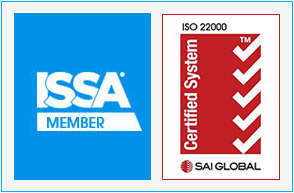The 7 June is World Food Safety Day. While the 2017-2018 outbreak of listeriosis in South Africa catalysed impressive levels of food safety monitoring and control in the country, the economic impact of COVID-19 threatens to undo some of the good work done. The economy is in dire straits. This could reduce money available for maintenance in food production plants, which could result in another foodborne pathogen outbreak in South Africa’s future.
There is little danger of COVID-19 being spread by the country’s food supply – there’s almost no evidence of this being a threat. Rather, the danger lies in COVID-19 causing major cashflow disruptions which mean manufacturers are less able to regularly maintain their environments. Cracks in the floors and walls, etc. can harbour pathogens like listeria. So continuous maintenance that includes the stripping and maintenance of equipment for effective cleaning is crucial – and this comes at a cost.
There is a common thread between listeria and COVID-19 in that both are unseen – one a bacterium and the other a virus – so in both cases you’re dealing with an invisible threat. Additionally, both require stringent hygiene protocols to mitigate risk and stop the spread. And both have resulted in a single-minded focus on good hygiene and manufacturing practices.
Listeriosis may have helped us to be better equipped to handle a crisis of COVID-19’s magnitude in the food production industry, in that we were prepared, with already heightened compliance requirements. One of the positive impacts of the listeria outbreak is that it brought a balanced approach between quality, production and maintenance. We just need to ensure the attention on COVID-19 does not distract from our rigorous monitoring in the food safety environment.
In our nearly three decades in operation, we have witnessed many changes. Positively, we have seen South Africa develop a stricter food safety auditing environment. During the listeriosis outbreak especially, the country considerably upped its standards, with intensive testing and an emphasis on practical protocols.
This was largely driven by the retail sector and the accredited audit bodies that verify that the industry meets applicable international and local regulations and standards. These include FSSC22000, BRC, HACCP, GFSI and IFS as well as retail-company-specific food safety audits, including FSA, AIB, IBL, Yum and Nandos. Audits are also carried out by the Department of Health and Department of Agriculture. The Food and Beverage Industry has set guidelines regarding certain microbiological standards.
Some of the most common foodborne illnesses in South Africa are listeria, salmonella, and E. coli. Listeriosis most commonly affects older and immunocompromised individuals and pregnant women. It is transmitted via ready-to-eat foods, including fruit and veg, and less likely to be carried via uncooked food such as raw meat. Here are some of the ways to mitigate the risk of foodborne illnesses at home:
– Wash your hands and work surfaces before preparing meals
– Don’t use the same utensils and cutting boards for raw meat, eggs and ready-to-eat foods like fresh veg
– Keep raw meat separate from your other groceries
– Cook meat at 70 degrees for at least two minutes to eliminate harmful bacteria
– Keep the fridge nice and cold at 5 degrees
Now is the time for us to all work together to ensure safety standards are strictly upheld. From the farm to the table, every touchpoint needs to comply with rigorous hygiene protocols. We are constantly impressed by the levels upheld in this country. While the current economic situation is dire, we need to take our lessons from the listeria outbreak and maintain good manufacturing and hygiene practices. We know everyone will do their part to protect food security and safety.
-ends-
Comments are closed.





